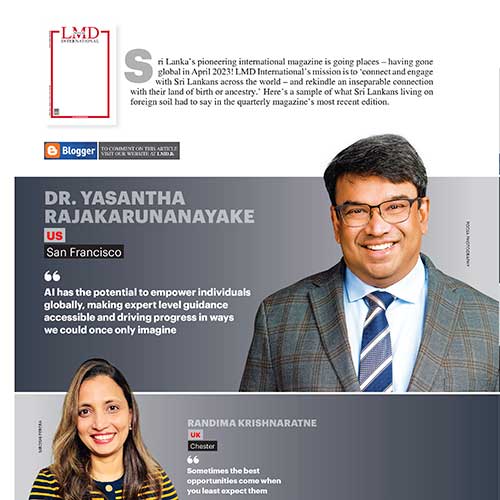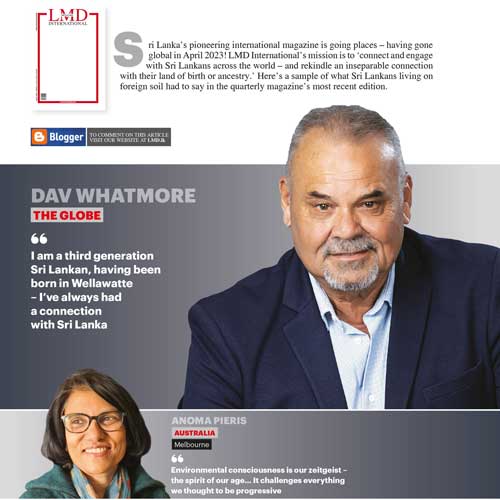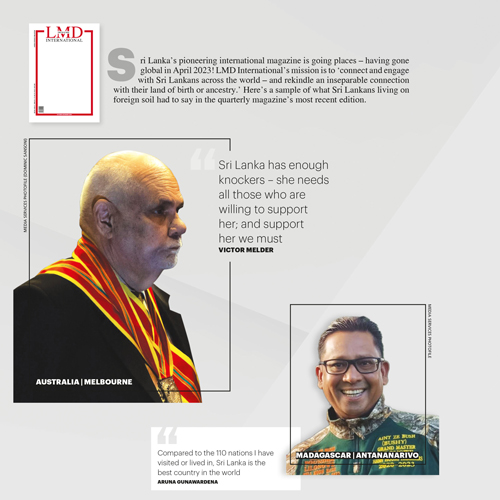SRI LANKANS OVERSEAS
CREATIVE POTENTIAL
Needra Silva moots greater independent thinking in education
Q: Has Sri Lanka regained composure following last year’s Easter Sunday attacks?
A: It was slowly regaining composure but with the new war against the coronavirus pandemic, this may have taken a backseat.
Q: How do you perceive Sri Lanka today?
A: Progress is subjective – it depends on each person’s gauge. It’s too early to measure given the recent political changes and with another election scheduled.
Q: And how do citizens in Australia view Sri Lanka?
A: People here are of the view that Sri Lanka is a paradise isle that is considered ideal as a holiday destination.
Q: Likewise, how do Sri Lankans living down under view their motherland?
A: Opinions are divided. Some say Sri Lanka has progressed while others feel it hasn’t as yet or not by much.
Q: What were your impressions of Sri Lanka on your last visit?
A: I was in Sri Lanka in December and didn’t observe much change since leaving the country in 2017, other than the new malls that had come up in the city. I was mainly in Colombo; so I cannot comment about the country as a whole although cleanliness in the city and streets left much to be desired.
Q: From afar, how do you perceive news about Sri Lanka?
A: News about Sri Lanka stems from friends living in the island and news websites. The positive news stories such as attempts to improve the technological realm are encouraging. Moreover, the way in which the pandemic was handled seemed to be as best as could be expected.
Q: How do you view the brain drain and why is there still no reversal of it?
A: It’s due to the quality of life and better opportunities than what Sri Lanka can offer or isn’t yet able to. The work-life balance is encouraged in Australia.
Sri Lanka is doing something right in the sense that the people who migrate to other countries do well. So what it needs to focus on is how to encourage and retain talent, creativity and intelligence – or at least, offer more opportunities for people to help develop the country.
It is important for Sri Lanka to encourage creativity and independent thinking with regard to education. Encouraging young children to work whilst studying (e.g. parttime jobs during school holidays) could help them learn practically and become more independent.
The other imperative is dignity of labour, which must be encouraged and recognised in Sri Lanka. In Australia, society does not look down on the type of job you do be it that of a bus driver, carpenter, garbage collector or cleaner. Every job is important and contributes to the development of the country.
Q: What should Sri Lanka focus on most in the coming decade?
A: Improving aspects of infrastructure, agriculture, education, technology, and law and order.
With the occurrence of the pandemic since the technology was in place, the need to travel to work, and for banking and grocery shopping, was minimised – at least in the larger cities. Less time spent on the road meant more time with families or to improve each other’s lives. It would be ideal if this filters down to the villages as well.
Q: And what are your hopes for the country in the next decade or so?
A: An improved quality of life with people spending less time travelling from point A to point B; and improvements in education to enable children across the land to access technology and learn English so they’re prepared to pursue higher education without falling short on account of language skills or technical know-how.
Teach children to think for themselves and not be spoonfed or memorise theory. Reduce the stress on them to attend tuition classes, which should be mainly to help children who are weak in a subject rather than being a competitive business venture.
Focus on teaching children about ethical behaviour. Educate them on the dignity of labour. Ethical thinking and behaviour must be inculcated from the inception of a young child’s life and ideally, as part of the curriculum.
Find ways to educate adults as well – maybe by using popular media – because children always follow their parents’ example. And improve support for the differently able, which in turn will help them contribute to the country.
Sri Lanka used to be an agriculturally rich and self-sufficient country, and it would do well to encourage and improve this aspect. Emphasise a self-sufficient model rather than being heavily dependent on imports.











